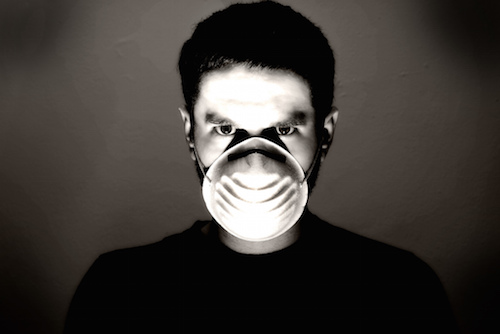We run our website the way we wished the whole internet worked: we provide high quality original content with no ads. We are funded solely by your direct support. Please consider supporting this project.

Are you Afraid of Demons?
I remember learning about germs in fourth grade. We were told our world was saturated with tiny invisible creatures that can infect wounds and make us sick. I immediately stopped sharing already-chewed gum with other kids, stop using my sister’s toothbrush and started washing my hands after going to the bathroom. Most kids had similar reactions.
But I’ll never forget how my friend Stephanie reacted. She got weird! About the only thing she ever talked about after this class was germs. We were playing badminton in gym class the next day, and she didn’t want to touch the badminton racket she was given until it was washed off. “It’s probably filled with germs,” she said. In fact, Stephanie didn’t want to touch anything that had been touched by anyone until it had been cleaned.
Stephanie had developed germ paranoia. I remember feeling bad about this, mainly because Stephanie was really cute and I had hoped to recruit her to join in a delightful but germy game some of us had recently discovered called spin-the-bottle. Now that Stephanie had become a germ freak, I realized this was probably never going to happen.
Experience has taught me that a certain percentage of people react to the teaching that the world is populated with hostile demons the way Stephanie reacted to the teaching about germs. They become demon paranoid. They fearfully obsess on the topic and tend to see a demon behind every headache, sneeze or computer glitch.
This is obviously not a sound biblical response. Despite the fact that Jesus and his disciples certainly believed the world was oppressed with evil forces, they exhibited a complete freedom from fear in regard to such entities. In fact, the fearlessness of the early Christians was one of the chief “selling points” of early Christianity, since most people in the ancient world lived in fear of demonic forces.
The reason the early church was so free from fear was because, as powerful as they knew the fallen powers to be, they were perfectly confident that Christ was far stronger and that he had in principal defeated the powers on Calvary. They knew that Jesus came to destroy the devil and his works (Heb 2:15; 1Jn 3:8) and to thereby set people free from any fear of the devil. The early Christians knew that in Christ all their sins had been nailed to the cross and that this meant the powers have been disarmed and made a laughingstock (Col 2:13-15). They knew that they were “in Christ,” and Christ was seated “far above all rule and authority, power and dominion, and every name that can be invoked” (Eph 1:21). They were confident that the one who resided in them (the Holy Spirit) was more powerful than the one who was “in the world” (1 John 4:4). And they knew that, as powerful as the fallen powers may continue to be, they could not separate disciples from the love of Christ (Rom 8:38-39).
The cure for demon paranoia is not to pretend the world isn’t populated with demonic forces, anymore than the cure for Stephanie’s germ paranoia would have been to deny the pervasive reality of germs. You never improve things by denying reality. To the contrary, the cure for demon paranoia—or germ paranoia—is to broaden your understanding of reality.
Yes, germs are everywhere. But they are not usually life-threatening, and there are simple things you can do to protect yourself against them. It’s important to know about them, but never appropriate to obsess on them. So too, it’s true that hostile demonic forces populate our environment. But for people who have made their life a domain in which God reigns, these forces can’t ever threaten the life we have in Christ — the only life that really matters to us. And there are simple things we can do to protect ourselves against these forces. It’s therefore important to know about demonic forces, but never appropriate to obsess on them.
The main thing believers need to do to counteract demonic forces is to simply remember who they are in Christ. In Christ, we have not been given a spirit of fear, but of power, love and self-control (1 Tim 4:7). In Christ, we are seated far above all rebel powers (Eph 2:6). In Christ, we have the same authority to vanquish evil powers that Christ had himself (Luke 10:19-20).
If we remember who we are in Christ, we have nothing to fear. Instead it’s the demonic forces that fear us. We are the aggressors who are breaking down their defensive gates, not the other way around.
Image by B Rosen via Flickr
Category: General
Tags: Demonization, Demons, Fear, Spiritual Warfare
Topics: Spiritual Warfare, Cosmic Conflict
Related Reading

What’s Wrong With The World?
Hartwig HKD via Compfight The reports coming out of Fort Hood this morning once again highlight that our world is messed up. And it often feels like we are rearranging the deck chairs on the Titanic as we try to find answers to address the problems we face. Here are some reflections by Greg on…

Satan and the Corruption of Nature: Seven Arguments
Man…trusted God was love indeed And love Creation’s final law – Tho’ Nature, red in tooth and claw With ravine, shrek’d against his creed” —Tennyson, In Memoriam Tennyson nailed it. We trust that God is love, but we also believe that God is the Creator of nature, and nature simply does not seem to point…

God’s Aikido Way of Defeating Evil
Greg continues his thoughts on the atonement with this installment highlighting the way God uses the evil intentions and actions of his enemies to bring about good. And because this strategy is based in love, the demons who encountered Christ could not possibly imagine what he was up to. They ended up participating in their…

4 Reasons to Wake Up to the Warfare Worldview
Image by postbear via Flickr A view of the world that grounds the problem of evil in spiritual warfare is not one that many modern people find easy to accept. To many contemporaries, the notion is preposterous that real, semi-autonomous, self-determining, and invisible spirits exist that can and do influence our lives. The whole thing sounds…

Do the Principalities & Powers Exist Within Space & Time?
In this episode Greg Answers: How do you fight, with a body bound to space and time, against something that doesn’t exist in space in time? Links: God at War Episode 34 http://traffic.libsyn.com/askgregboyd/Episode_0034.mp3

Were the Consequences for Adam & Eve’s Choice Fair?
In this episode Greg ponders Adam and Eve’s choice and the enormous consequences of that seeming arbitrary decision. Links: Greg’s book: “God at War“ http://traffic.libsyn.com/askgregboyd/Episode_0021.mp3
